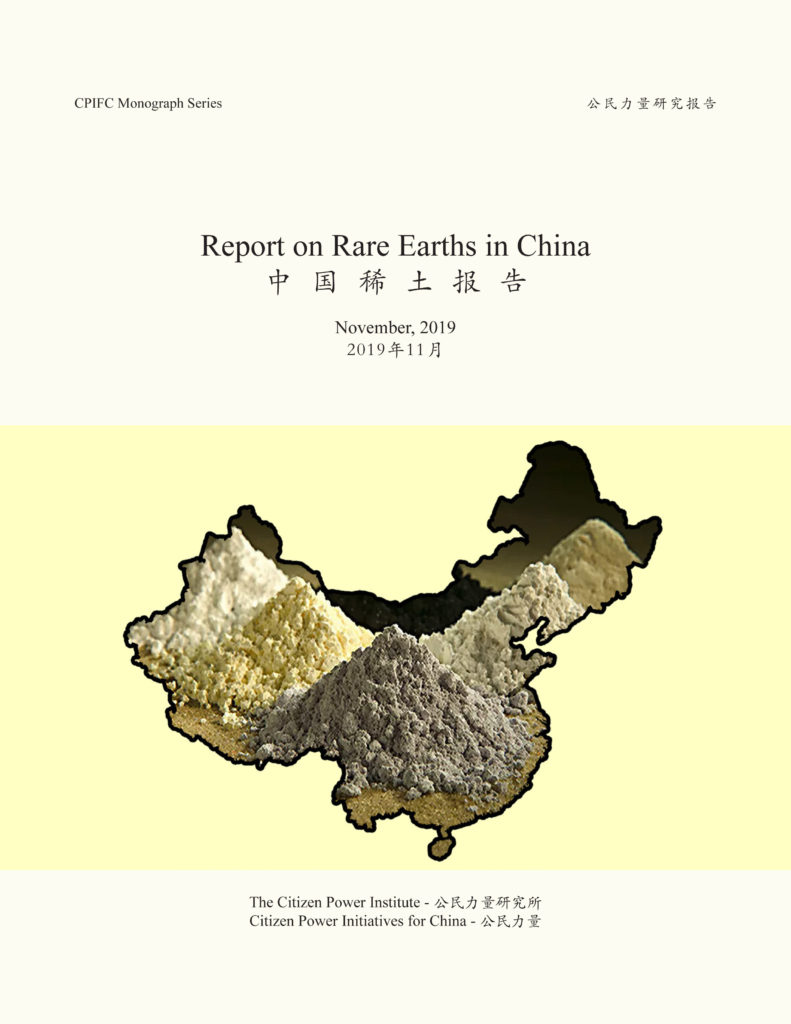Today, Citizen Power Institute, a think tank run by Citizen Power Initiatives for China, launches its research monograph Report on Rare Earths in China. The report is authored by the Institute’s advisor and well-known environmental scientist Dr. Wang Weiluo. A number of members of the organization took part in the project.

Report Summary
Rare earth elements are crucial to the modern society for producing electronic devices. China was once the dominant country in the rare earth market by controlling more than 90% of the world’s rare earth production. However, the report by Wang Weiluo offers his insight on the history and reason behind the downfall of China’s rare earth status on the international stage, and how its strategy might fail to win the trade war against the U.S.
Deng Xiaoping famously said in 1992 that “Middle East has its oil, China has its rare earth”, recognizing the importance of rare earth to China’s future. According to the State Council Information Office, about 23% of global reserves are in China by the date June 2012, and more than 90% of global rare earth production supply. Besides the abundance of resources, its low cost of labor and loose environmental regulations on mining played an important role in helping China to surpass its competitors. The world relies heavily on the export of China’s rare earth products for automotives, high technology devices and defense etc. While China intents to use restriction on rare earths export as a leverage in the trade war with the U.S., its internal issues on rare earths should not be ignored.
The government controls the investment and production quantity of rare earths, after consolidating all rare earth enterprises into six big state-owned enterprises such as Northern and Southern Rare Earth Groups, led to a later national wide aggressive mining style and caused a massive surplus in supply. Professor Xu Guangxian, “The Father of Chinese Rare Earths Chemistry”, was mentioned in the report as the first person suggested that the rare earth resources could be exhausted within 30 years in 2005. Furthermore, the environment in China took a big hit due to years of paying no attention to the ecological damage from excessive mining and the byproducts like waters of the tailing ponds are extremely toxic and can be radioactive. An enormous price has to pay to manage and repair the environment from destructive development of rare earth resources in China.
China believes the restriction on rare earth export would create a huge impact on the U.S., but that would probably only cause a short term economy suffering when the U.S. can look for rare earths import from some other countries. Besides, recycling rare earth metals or finding new alternative resources can also challenge China’s decision. Wang Weiluo’s report provides the rise and fall of using rare earth as strategic resources in China with explicit details, as well as the serious damages of China’s ecological environment brought by the development of rare earths.
This report can be obtained here: https://www.amazon.com/Report-Rare-Earths-China-%E4%B8%AD%E5%9B%BD%E7%A8%80%E5%9C%9F%E6%8A%A5%E5%91%8A-ebook/dp/B08129BJ1X/
